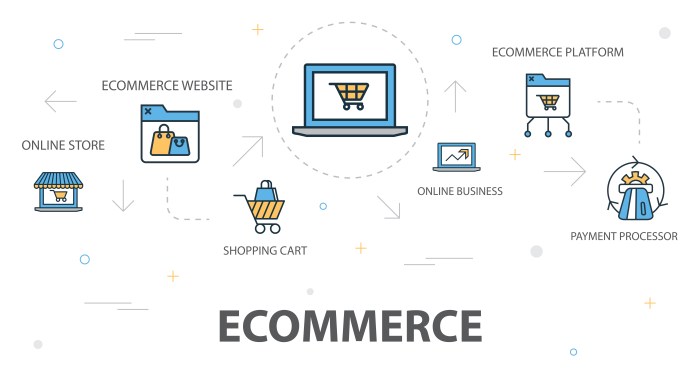E-commerce platforms are the backbone of online retail, shaping the way we buy and sell in the digital age. Get ready to dive into the world of e-commerce platforms with a mix of style and substance, revealing the ins and outs of this dynamic industry.
From defining e-commerce platforms to exploring their key features and security measures, this guide will equip you with everything you need to know to thrive in the competitive e-commerce landscape.
Overview of E-commerce Platforms
E-commerce platforms are online software solutions that allow businesses to create and manage their online stores. These platforms play a crucial role in the world of online retail by providing a virtual space for businesses to showcase and sell their products or services to a global audience.
Types of E-commerce Platforms
- Hosted E-commerce Platforms: These platforms host your online store on their servers, taking care of technical aspects like security and updates.
- Self-hosted E-commerce Platforms: With self-hosted platforms, you have more control over your store’s customization and data, but you are responsible for technical maintenance.
- Open-source E-commerce Platforms: These platforms are free to use and can be customized extensively, making them popular among developers and businesses looking for flexibility.
Facilitating Online Transactions and Sales
E-commerce platforms provide a user-friendly interface for customers to browse products, add them to their cart, and securely complete transactions online. They integrate payment gateways, inventory management, and order processing systems to streamline the entire sales process.
Popular E-commerce Platforms and Unique Features
- Shopify: Known for its ease of use and wide range of customizable templates, Shopify is a popular choice for businesses of all sizes.
- WooCommerce: As a plugin for WordPress, WooCommerce offers seamless integration with the popular content management system, allowing for easy setup and management.
- Magento: Ideal for larger businesses, Magento provides advanced features for scalability and customization, making it a robust option for high-volume sales.
Features and Functionality: E-commerce Platforms

When it comes to e-commerce platforms, there are key features that a robust platform should offer to ensure a smooth and successful online shopping experience for both businesses and customers. These features play a crucial role in the functionality and effectiveness of an e-commerce platform.
User-Friendly Interfaces
User-friendly interfaces are essential in e-commerce platforms as they directly impact the overall user experience. A well-designed interface makes it easy for customers to navigate the website, find products, and complete purchases. Features like intuitive search functions, clear product categories, and simple checkout processes can significantly enhance the user experience and increase conversion rates.
Customization Options
Different e-commerce platforms offer varying levels of customization options to cater to the unique needs of businesses. Customization features allow businesses to personalize their online stores, including branding, product displays, and promotional activities. Platforms like Shopify and WooCommerce provide extensive customization options, while others may have more limited capabilities.
Mobile Responsiveness
In today’s digital age, mobile responsiveness is crucial for e-commerce platforms. With the increasing use of smartphones and tablets for online shopping, it is important for platforms to be optimized for mobile devices. Mobile-responsive design ensures that the website adapts to different screen sizes and provides a seamless shopping experience across all devices. Platforms like Magento and BigCommerce prioritize mobile responsiveness to meet the demands of modern consumers.
Payment Gateways and Security

When it comes to e-commerce platforms, ensuring secure payment gateways is crucial for both businesses and customers. The safety of online transactions is paramount in building trust and credibility in the digital marketplace.
Importance of Secure Payment Gateways
- Secure payment gateways protect sensitive financial information, such as credit card details, from unauthorized access.
- They help prevent fraud and reduce the risk of data breaches, safeguarding both the business and the customer.
- Secure payment gateways enhance customer confidence in making online purchases, leading to increased sales and repeat business.
Different Payment Gateway Options, E-commerce platforms
- Popular payment gateway options include PayPal, Stripe, Authorize.Net, and Square.
- Each payment gateway has its own set of features, fees, and integration capabilities, allowing businesses to choose the best option for their needs.
- Some payment gateways offer additional security measures, such as tokenization and encryption, to further protect sensitive data.
Data Security in E-commerce Platforms
- E-commerce platforms implement SSL encryption to secure data transmission between the customer’s browser and the server.
- They comply with PCI DSS standards to ensure the safe handling of payment information and protect against data breaches.
- Regular security audits and updates are conducted to identify and address vulnerabilities in the system.
Best Practices for Enhancing Security
- Implement two-factor authentication for customer accounts to add an extra layer of security.
- Regularly update security patches and software to protect against emerging threats and vulnerabilities.
- Educate employees on cybersecurity best practices to prevent social engineering attacks and phishing scams.
Integration and Scalability
Integrating third-party tools with e-commerce platforms is crucial for enhancing functionality and providing a better user experience. By integrating tools like customer relationship management (CRM) systems, email marketing platforms, and analytics tools, e-commerce platforms can streamline processes, gather valuable data, and improve overall performance.
Common Integrations for E-commerce Platforms
Integrations play a key role in enhancing e-commerce platforms. Some common integrations include:
- Payment gateways such as PayPal, Stripe, and Square for secure transactions
- Inventory management systems like TradeGecko or Skubana for efficient stock control
- Shipping and logistics integrations like UPS, FedEx, or ShipStation for smooth order fulfillment
- Marketing automation tools such as MailChimp or HubSpot for targeted campaigns
Scalability Challenges in E-commerce Platforms
As businesses grow, e-commerce platforms often face challenges in scalability due to increased traffic, transactions, and data volume. Some common scalability challenges include:
- Performance issues like slow loading times and website crashes during peak traffic periods
- Difficulty in managing a larger product catalog and inventory efficiently
- Ensuring data security and compliance with regulations as the business expands
Strategies for Ensuring Scalability and Flexibility
To ensure scalability and flexibility in e-commerce platforms, businesses can implement the following strategies:
- Utilize cloud-based hosting services to handle increased traffic and data volume
- Implement a scalable architecture that can grow with the business without compromising performance
- Regularly monitor and optimize the platform for speed, security, and user experience
- Invest in robust data backup and recovery systems to prevent data loss or downtime